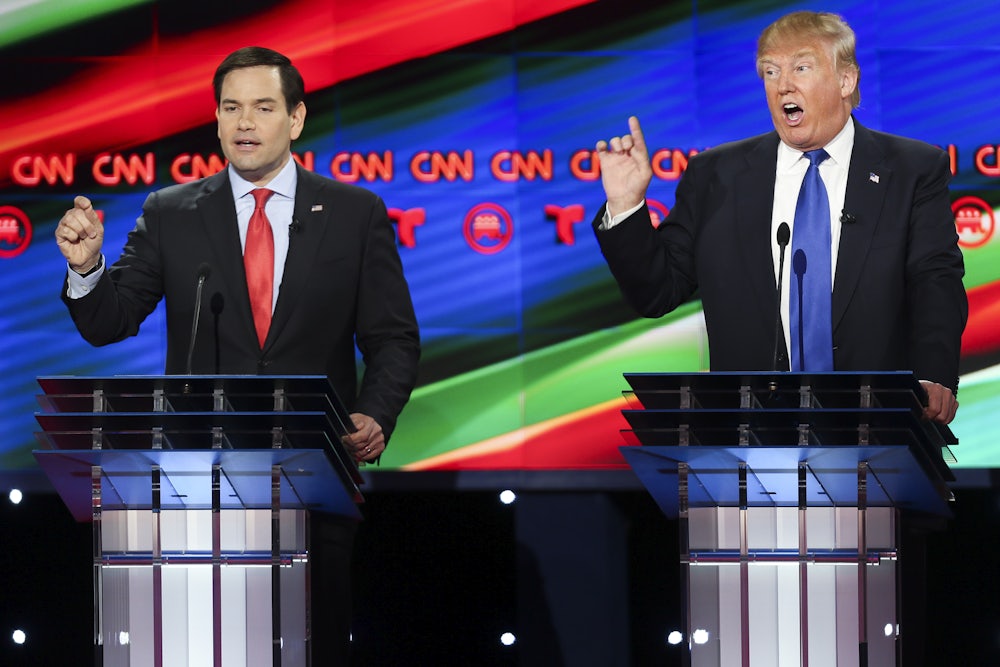Marco Rubio was once the Great Republican Hope. Charismatic, Cuban-American, and conservative, the 39-year-old was the face of the party’s future when he rode to the Senate on the “Tea Party tidal wave” of 2010. GOP leaders called him “our Barack Obama.” National Review cheered, “Yes, he can.” He was exactly the corrective the Republican National Committee prescribed in its autopsy after Mitt Romney lost to Obama in 2012, and Time even dubbed him “the Republican savior.”
Except he wasn’t. Not even close. Rubio’s 2016 presidential campaign, like virtually every GOP bid for the White House not run out of Trump Tower, was a massive disappointment. He won only the state of Minnesota. He was eviscerated for repeating the same tired talking points like a short-circuiting robot. When he made his last stand in his home state of Florida, voters handed him what The New York Times called “a humiliatingly distant second-place finish”: 27 percent to Trump’s 46. A day later, Rubio dropped out.
Rubio had been diminished by Trump in numerous ways. Trump tried to emasculate him, suggesting his shoes were effeminate. He called Rubio a “little boy” and a “frightened little puppy.” Significantly, he also got Rubio, a sitting senator, to respond in kind, hurling his own juvenile taunts—including a penis size joke—yet they were always ineffectual in the face of Trump. It was as if Trump’s insults were a self-fulfilling prophecy.
That may have be the future nominee’s last masterstroke, in fact. He turned the Republicans’ next big thing into someone quite small: “Little Marco.”
Given that history, it might have been surprising when Rubio confirmed Tuesday that he’s still supporting Trump for president, despite the Access Hollywood tape in which the nominee brags about his ability to commit sexual assault—and which Rubio had condemned in a tweet hours after the news broke on Friday.
Donald's comments were vulgar, egregious & impossible to justify.
— Marco Rubio (@marcorubio) October 8, 2016
No one should ever talk about any woman in those terms, even in private.
Rubio’s non-reversal distinguishes him from the long list of prominent Republicans—including his Senate colleagues John McCain, Kelly Ayotte, John Thune, Dan Sullivan, Rob Portman, Lisa Murkowski, Mike Lee, Jeff Flake, and Michael Crapo—who over the past few days have withdrawn their Trump endorsements, declared that they won’t vote for him, or demanded that he quit the race.
Why stick with a politically toxic figure who belittled him?
“I do not want Hillary Clinton to be our next president,” he insisted. “And therefore my position has not changed.”
Here’s a likelier reason: Rubio wants to secure Trump’s voters for a future presidential campaign, should the nominee lose. Rubio wouldn’t be the only one employing such a strategy, and it shows how the Republican Party’s reckoning with Trumpism might be a long ways off yet.
Rubio won’t reveal his thinking, of course, but a fuller picture is emerging. His decision to seek another Senate turn, after pledging he wouldn’t run for reelection, suggests he’s mulling another bid for the presidency, perhaps as soon as 2020. And according to new reporting by Politico, his sticking by Trump, even in spite of his increasing toxicity, is very much in service of that goal.
“None of us thinks Trump really has a prayer of winning anymore,” one Rubio backer told the publication, “so the question becomes: What happens to all of his voters? How do we keep these voters in the Republican fold? Poking a stick in their eye by withdrawing an endorsement is bad for Marco in the long term and in the short term: These people might not vote for him, and that’s a big part of the Republican base.”
In the short term, sticking with Trump is a less risky position for Rubio since polling shows him up by seven in his race against Patrick Murphy, his poorly known Democratic challenger who spent much of an appearance on MSNBC Tuesday fielding questions about a Super PAC pulling ads for his campaign. There’s no point in alienating Trump voters when you’ve got a healthy lead—and if his loyalty to the nominee starts hurting those poll numbers, there’s still time to rescind his endorsement. Rubio has proven himself craven enough.
Here’s the tragedy of Marco Rubio. He was a rising star who could have competed nationally with Hispanics—Hillary Clinton’s pollster worried as much in an email recently leaked by WikiLeaks. “I’m beginning to worry more about Rubio than the others,” Joel Benenson wrote to Clinton campaign chairman John Podesta, campaign manager Robby Mook, and others in February. “He has stronger right wing cred than Jeb and he’s finding a way to the middle enough for now and he will be the most exciting choice to Republicans. Could pose a real threat with Latinos etc.”
Rubio could have helped bring the party to the middle on immigration, as he seemed to want to do with the Senate’s Gang of Eight negotiations in 2013. But Rubio walked away from those talks, and this week, by sticking with a racist nominee whose success lies in appealing to white grievance, he provided further evidence he’s balking at efforts to reform the right. At this rate, Rubio will be trapped in the tentacles of Trumpism long after 2016.
Much as he fumbled his presidential campaign by trying to be a little of everything to everyone, Rubio is missing the chance to take on the most toxic elements in his party. That’s bad news for those trying to move the GOP in a more moderate, multicultural direction. Of course, Trumpism’s general election prospects being what they are, that’s probably bad news for Rubio in 2020, too.
